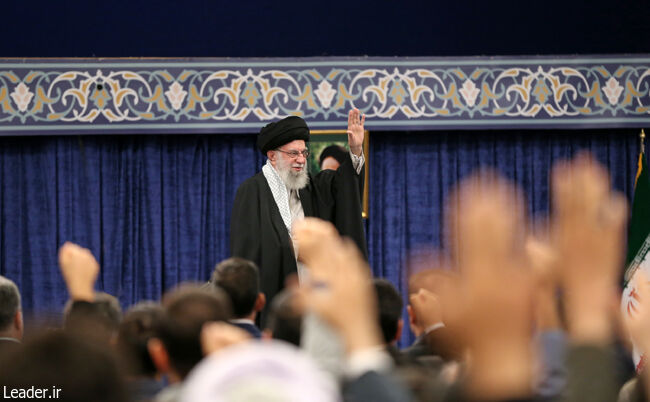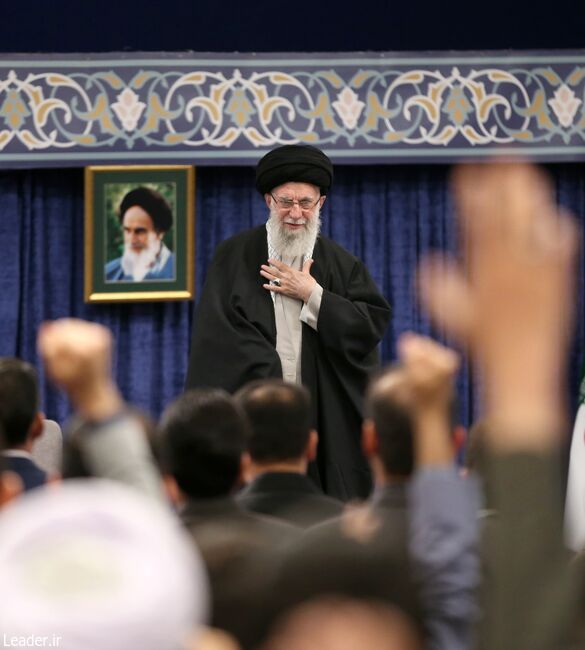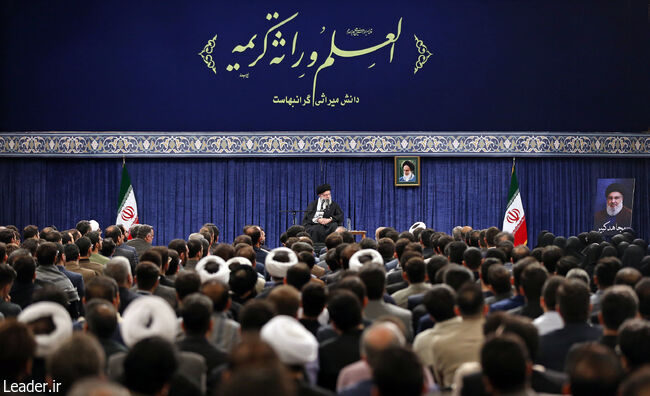This morning, Ayatollah Khamenei, the Leader of the Islamic Revolution, met with hundreds of scientific elites, Olympiad winners, and top university entrance exam performers and emphasised the need to maximise the use of elites in various sectors and create opportunities for them to influence the country's affairs. He said, "Today, elites' most important duty and effort is to create a new and resurgent scientific movement."
The Leader of the Islamic Revolution also emphasised that he would soon speak to the Iranian nation regarding the issues of Gaza and Lebanon. He added, "The root of the region's problems lies with those like the U.S. and certain European countries, who falsely claim to advocate for peace and stability. Therefore, the only way to end conflicts and wars in the region is by reducing the malevolence of these countries."
At the beginning of the meeting, the Leader of the Revolution referred to the martyrdom of the great fighter Sayyed Hassan Nasrallah. He said, "These days, we are in mourning, and I am particularly deeply saddened because the loss of Sayyed Hassan Nasrallah is not a small tragedy. However, despite the public mourning in the country, we did not postpone the meeting with the elites, which had been planned in advance."
Ayatollah Khamenei stated that the meeting with the elites was held at the scheduled time to emphasise the importance of the issue of elites. He added, "The message of this meeting is that although we are in mourning, our grief does not mean being distressed, depressed, or withdrawn. Rather, our mourning is akin to that of Imam Hussain (a.s.), which is life-giving, motivating, and inspiring action and progress. This message should truly penetrate our hearts and souls."
He stated, "The root cause of the problems and the instigation of conflicts and wars in the region is the presence of the United States and some European countries that falsely speak of peace and tranquillity. If their malevolence decreases in this region, conflicts and wars will end, and the countries themselves will be capable of managing the region and coexisting in peace and security."
The Leader of the Islamic Revolution regarded provoking Saddam to attack Iran, leading to bitter and difficult days, as an example of the warmongering of the United States and the West in the region. He said, "The current affection between Iran and Iraq, which is most vividly manifested in the grand Arbaeen march, is a clear example that shows the primary cause of regional problems lies with the false claimants of peace. It is essential that, with God's assistance and the great determination of the Iranian nation, along with inspiration from the Islamic Revolution and collaboration with other nations, their malice has been reduced in the region."
During this meeting, Ayatollah Khamenei praised the thoughtful and hopeful remarks made by seven elites and the Deputy Science Minister about intellectuals. He said, "The quality of a young mind is its active nature and having lofty goals, which is undoubtedly commendable. However, these plans and programs must be pursued seriously and conveyed to the relevant authorities in practical and achievable proposals." The Leader of the Revolution then addressed three issues relevant to the meeting topic: recognising the reality of elite status in the country, preserving and multiplying elites, and the duties and responsibilities of elites.
In discussing the first topic, the necessity of recognising the realities of elite status in the country, he considered failure to acknowledge assets and capacities as a significant affliction for any nation. He emphasised the importance of recognising these capabilities in the face of adversaries' efforts to conceal or deny them. He said, "Some people still think like they did 100 years ago and refuse to accept the reality that, in the current environment and ecosystem of the country, very significant and astonishing events could occur in the world."
Ayatollah Khamenei ranked the nation's elites and the foundations for developing them among its most important assets, adding, "The most crucial foundation for producing elites is intellectual ability, and in terms of IQ, Iran is among the leading countries in the world."
The Leader of the Revolution observed that nurturing elites had been completely neglected during the Shah's tyrannical regime. He said, "After the Revolution, attention was given to various capabilities of the elites, but this focus must be intensified by increasing their involvement in different fields such as water, oil, gas, nuclear energy, nanotechnology, and emerging sciences like artificial intelligence. These are also some of the responsibilities of the Vice Presidency for Science and Technology. The formation of the National Elites Foundation was essentially aimed at identifying elites and utilising them for important tasks.
Ayatollah Khamenei mentioned that retaining and multiplying the number of elites and preventing their flight from the country due to false hopes depends on the elite feeling that they have a meaningful impact on the nation. He added, "An elite confronted by a closed door at a particular research institute or government agency feels ineffective and is forced to take on jobs for a livelihood that prevent them from continuing as an elite."
He emphasised the need for clear pathways for elites to show their abilities and contribute their skills. He said, "The scientific department can also serve as a bridge in this regard. Of course, all government and public institutions must utilise elites and create a sense among them that their presence has an impact and is valued." The Leader of the Revolution referred to the departure of some elites from the country to pursue their development and continue scientific research because such opportunities were available in certain countries and emphasised the need to provide facilities for research and scientific growth. He also stressed that another area where elites can play a role is through the establishment of think tanks as fora for experts in various scientific fields. In this regard, the scientific department acts as a connecting link with relevant institutions. Bureaucratic obstacles must also be eliminated, which can harm the elites' sensitive spirit.
Addressing the third aspect related to the elites, namely their responsibilities and duties, he added, "The responsibility of the elites is greater than that of the general public because they have been blessed with more divine gifts, such as knowledge, reputation, and wealth, compared to others."
Ayatollah Khamenei emphasised that elites are responsible for the country's scientific movement. He pointed out, "The scientific movement was initiated and embraced by institutions and universities, leading to an increase in the country's scientific development. However, it was noted that this growth rate has somewhat declined since that time."
He called on the elites to struggle for a scientific movement, emphasising that the country needs a new scientific uprising, which is their responsibility. He added that scientific and research centres also have a role, but the main driving force is the individual elite.
The Leader of the Islamic Revolution described the creation of a new scientific movement and uprising as the Jihad of the Elites, emphasising that this new scientific movement would enable them to surpass rivals and adversaries. He stated that one outcome of scientific and technological superiority would be to prevent the enemy from inflicting harm on the people of Gaza and the Dahieh of Beirut, as well as to stop the provocations that burn the hearts of the people and the youth.
In his next recommendation, he emphasised the necessity of increasing the number of knowledge-based companies, noting the significant gap between the actual number of these companies and the target set in the Seventh Development Plan. He added, "However, this increase should not come at the expense of lowering standards for knowledge-based companies. It must be done so that these companies are genuinely knowledge-based and subject to strict assessments."
At the beginning of this meeting, Dr Hossein Afshin, the Deputy for Scientific, Technological, and Knowledge-Based Economy Affairs of the President and the head of the National Elite Foundation, said, "Today, technology has become the main component of power in the world, and creating a supply chain and being at the forefront of technology (development) is of strategic importance." He presented a report on his office's upcoming plans to enhance technological power, including developing a comprehensive artificial intelligence program.
Also, seven members of the National Elite Foundation, Mr.:
Milad Lotfi, PhD student in International Relations
Hojjat Mianabadi; PhD in Water Management
Seyyed Ali Madani Zadeh, PhD in Economics and recipient of the Bronze Medal at the International Mathematics Olympiad in 2000
Rasool Looie, PhD in Agricultural Development and recipient of a scholarship from the National Elite Foundation
Sajjad Enteshari; PhD in Water Resource Management and recipient of a scholarship from the National Elite Foundation.
And the ladies:
Maryam Rezapour, PhD in Industrial Engineering and first place in her doctoral program, and Hananeh Khorramdashti, a 12th-grade student at Farzanegan 2 High School and recipient of the Gold Medal at the 2024 International Astronomy and Astrophysics Olympiad, expressed their opinions and suggestions regarding various issues in the country.
The necessity of transforming the country's scientific diplomacy by improving the process of attracting elite regional and international students; creating a framework to enhance the application of artificial intelligence in priority areas such as energy, food security, logistics, and monetary policy; resolving conflicts of interest in water policy-making; utilizing soft power tools and the capacities of regional cooperation organizations to improve water diplomacy; achieving the goals of development programs and high-level documents by empowering the country's system of governance and mobilizing elites; enhancing human capital by equipping elites with administrative skills and reforming the recruitment process in government agencies; addressing structural inflation and regulations by eliminating parallel councils and establishing steering committees for progress; reforming the university entrance exam assessment process by alleviating the heavy burden of final exam scores for university admission; providing elite models and promoting a scientific lifestyle for adolescents; reducing age restrictions for participating in scientific Olympiads; ensuring food security through the management of food waste and the necessity of intermediate circles for implementing the operational model of transforming the Makran coast into the economic capital of the country were among the topics raised by the elites present in today's meeting with the Leader of the Islamic Revolution.



